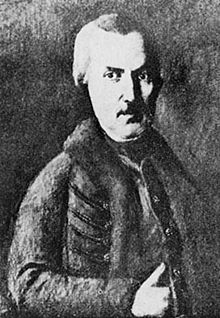George of Aranka
Georg von Aranka , also György Aranka , (born September 15, 1737 in Szék , Transylvania , † March 11, 1817 in Márosvásárhely , Transylvania) was a Hungarian writer and lawyer .
Life
Georg von Aranka was the son of a reformed superintendent . He received his early lessons in Márosvásárhely (Romanian: Târgu Mureș ). There he already showed memory problems, for which his teacher severely punished him. It was reported that Aranka had been punished by the teacher with the neck iron even for coughing . He was then trained in Aiud at a seminary where he dealt with philosophy and theology and, after completing his studies, became a teacher of logic . He was also preparing, clergymanto become and gave trial sermons. He had trouble memorizing his sermons, and at a church service he held in a village, he forgot a request from the Our Father . In 1764 this moved him to give up his plan to become a clergyman. He turned away from theology and decided to become a lawyer .
In 1764, Aranka was appointed to Adam von Nemes' office . Two years later he became a protocolist at Anton von Domokos' office . There he performed services such as cleaning shoes or setting the table, as was customary for Hungarian law interns at the time. Von Domokos was satisfied by playing cards with von Aranka, for example. He later became a protocolist for Michael von Cserey , and in 1774 with David von Székely . Around this time he was learning both French and German . He studied mathematics with Alexander Kovásznai in Târgu Mureș, which he had missed during his studies. Around 1777 he began to write.
At the same time, von Aranka was busy translating a French-language work by Drelincourt , the content of which is supposed to take away the fear of death, into Hungarian. Finally he published the translation as a philosophical-theological work under the name of his father. He also studied law, although there were no legal chairs in Hungary at that time, so he had to read and copy files from litigation. Because this forced him to sit a lot, he suffered from hypochondria and weak eyes that made sunlight unbearable. For the time being he wore a sun hat to overcome the last evil. Finally von Székely went with him to Vienna , where his best doctors lived. They claimed that Aranka's eye disease could not be cured. A pharmacist in Sighișoara , on the other hand, recommended bathing in a river every day, which slowly relieved Aranka's weak eyes.
After his recovery, von Aranka went back to Vienna, where he expressed his wish to Princess Maria Theresa to get a job. Since she was benevolent to him, she made him a supernumerar assessor. 1787 appointed him Emperor Joseph II. To the Assessor to Targu Mures. In 1790 he became the supernumerar of the royal table, and in 1796 he became a real assessor . It was reported that he was busy with other things in meetings, so he wrote poems or essays, but at the same time listened. In 1801 he also began to attend lectures on Kantian philosophy. From 1804 he also acted as a censor of books.
At the age of 79, von Aranka died in Târgu Mureș in 1817 when he fell and hit his head against the wall. He was described as a sociable person. He remained unmarried. He earned enough money to live through his offices. In turn, he used the money his father left him to support his brother and friends financially.
Works
Georg von Aranka wrote many occasional poems, whereby it was noted that he had not mastered poetry from birth, and 17 independently published works. He founded a learned society in Transylvania, whose aim was to promote the Hungarian language. However, this society only existed for a few years. He also translated French works. In addition, he collected documents on Transylvanian history.
literature
- Austrian Archive for History, Descriptions of the Earth, State Studies, Art and Literature. Volume 1, 1831, pp. 510-512, online .
- Constantin von Wurzbach : Aranka, Georg von . In: Biographisches Lexikon des Kaiserthums Oesterreich . 1st part. University book printer L. C. Zamarski (formerly JP Sollinger), Vienna 1856, p. 58 ( digitized version ).
Individual evidence
- ^ Supernumerar - surplus civil servant candidate on duden.de
| personal data | |
|---|---|
| SURNAME | Aranka, Georg von |
| ALTERNATIVE NAMES | Aranka, György |
| BRIEF DESCRIPTION | Hungarian writer and lawyer |
| DATE OF BIRTH | September 15, 1737 |
| PLACE OF BIRTH | Szék , Transylvania |
| DATE OF DEATH | March 11, 1817 |
| Place of death | Târgu Mureș |
